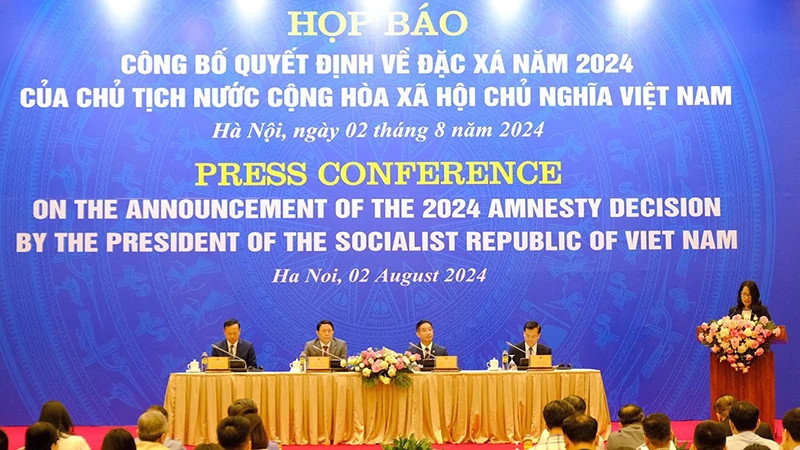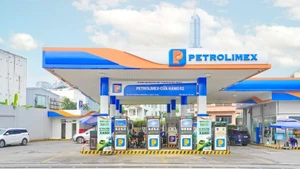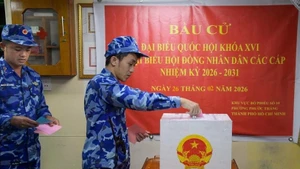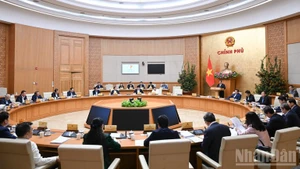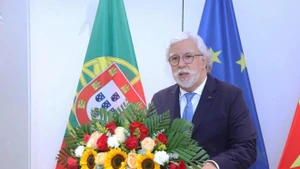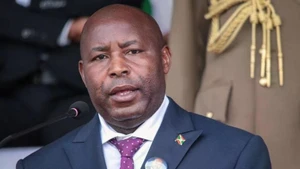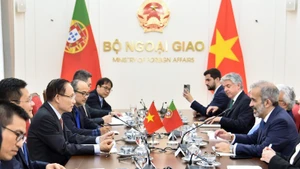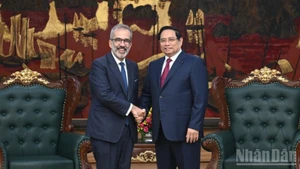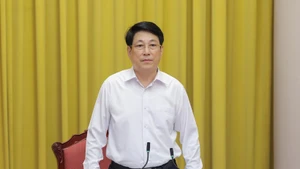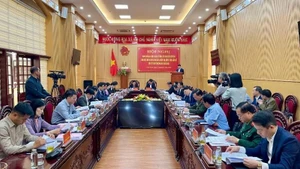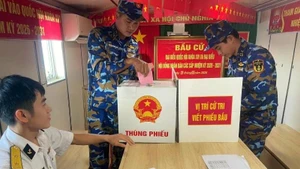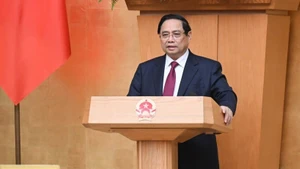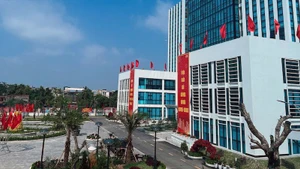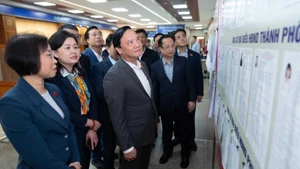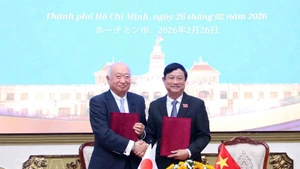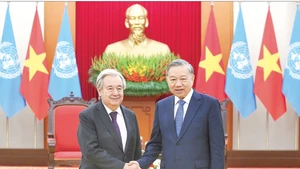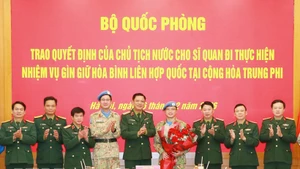Thereby, it demonstrated the lenient policy of the Party and State and the humane tradition of the nation towards criminals, encouraging them to repent and train to become useful people for society; at the same time, affirming the consistent policy of the Party and the State of Vietnam in promoting and protecting human rights in a fair and equal manner for all citizens, including those serving prison sentences.
On July 30, President To Lam issued Decision No.758/2024/QD-CTN, on amnesty and early release for those sentenced to fixed-term imprisonment or life imprisonment on the occasion of the 79th anniversary of the National Day of the Socialist Republic of Vietnam (September 2) and the 70th anniversary of the Liberation of Hanoi (October 10).
To ensure that the amnesty work is carried out seriously and effectively, reflecting the humane and lenient policies of the Party and State towards criminals, the Amnesty Advisory Council issued Instruction No.88/HD-HDTVDX, dated August 2, 2024, on the implementation of Decision No.758/2024/QD-CTN.
In addition, the Government issued Official Dispatch No.76/CD-TTg dated August 7, 2024, on implementing amnesty work in 2024. From here, it helps all classes of people, especially prisoners, to have full and correct awareness of the standards, processes, and procedures for considering amnesty, to protect their legitimate rights and interests through self-comparison and monitoring the activities of competent agencies.
At the same time, it contributed to further raising the awareness of all levels, sectors, and social organisations, about caring for and creating conditions to help people who enjoy leniency policies to remove their inferiority complex and quickly reintegrate into the community.
This opened up opportunities for rehabilitation for prisoners who have made a lot of progress, have a good sense of reform, are classified as serving their prison sentences from good or better, and meet the conditions prescribed in the Amnesty Law 2018; Law on Enforcement of Criminal Judgments 2019 and other relevant legal documents.
Since 2009, the Vietnamese State has carried out 9 major amnesties, releasing more than 92,000 prisoners early. According to the Deputy Head of the Office of the President Pham Thanh Ha, with the amnesty decisions of the President, tens of thousands of people have enjoyed the joy of clemency, soon returned to reunite with their families, and are ready to rebuild their lives. Most amnestied people have returned to their places of residence, stabilised their lives, and made an honest living.
Since 2009, the Vietnamese State has carried out 9 major amnesties, releasing more than 92,000 prisoners early.
The report at the Conference on the implementation of the President's Decision on amnesty in 2024 held by the Ministry of Public Security said that the rate of people granted amnesty reoffending was very low (up to now, only 2 people granted amnesty in 2022 have reoffended, accounting for 0.08% of the 2,438 people granted amnesty in 2022).
The amnesty work has ensured political, legal, professional, and foreign affairs requirements, and has been approved by the people in the country and highly appreciated by international public opinion. This result comes from the fact that Vietnam has made adjustments and improved the legal framework to minimise possible violations and loopholes in the amnesty work.
The Amnesty Law and Decision No.758/2024/QD-CTN (dated July 30, 2024) also strictly regulated 15 cases that are not eligible for amnesty, which are crimes against national security, subjects who have been granted amnesty but continue to re-offend, or criminals with numerous records.
These regulations aim to ensure fairness for those considered for amnesty by excluding prisoners who still need to be isolated from society; prisoners who do not show signs of remorse or repentance; and those who continue to commit crimes after enjoying the leniency policy of the Party and State.
At the same time, policies and laws related to community reintegration for people granted amnesty, released early from prison, and those who have completed their prison sentences have also been innovated by classifying these subjects as disadvantaged and vulnerable groups in society.
Therefore, the common point of the relevant policies is to help people released from prison access basic citizen rights, creating conditions for them to re-establish their position in society.
These include Decree No.49/2020/ND-CP dated April 17, 2020, of the Government, detailing the implementation of the Law on Execution of Criminal Judgments on Community Reintegration; Decision No. 22/2023/QD-TTg of the Prime Minister dated August 17, 2023, on credit for people who have completed their prison sentences.
Accordingly, before receiving a special pardon decision, eligible prisoners are disseminated and educated on policies and legal regulations on community reintegration such as psychological counselling, support for legal procedures; career orientation, improving job search ability; financial support from the prison's Community Reintegration Fund.
Prisoners who are not eligible for amnesty are educated politically and ideologically by prison officers to see the superiority and fairness of Vietnamese law. After attending activities and studying, many have felt secure in reforming and continuing to strive.
After the amnesty decision, those rehabilitated are supported with loans to learn a trade, produce, and do business. From this policy, billions of dong from loan capital have promptly reached rehabilitated prisoners who want to create a livelihood for themselves and support their families.
In addition, many models, movements, and good practices have mobilised and promoted the role of organisations, social groups, and people to join hands to help those who have been pardoned.
Typical models include educational management, helping people who have completed their prison sentences to reintegrate into the community, reforming people who have made mistakes in the community, protecting national security, and the people uniting to build a cultural life in residential areas.
Currently, these models are being implemented in most localities and have achieved many positive results. Thereby, the majority of people who have been granted amnesty in particular and those who have completed their prison sentences in general have overcome their inferiority complex, gradually creating a new life, and becoming a good example in the community.
From this, it can be seen that the strictness and humanity of the Vietnamese criminal law system does not stop at handling all crimes promptly, with the right people, the right crimes, without exceptions, without forbidden areas, but also lies in the leniency itself, specifically expressed in the amnesty regime.
People who have been granted amnesty continue to receive the attention of the whole society in stabilising their lives. This is also the reason why the rate of pardoned people reoffending in Vietnam is very low compared to many countries in the world.
Despite this fact, some ill-intentioned, reactionary, and extremist organisations still deliberately use the name of protecting the rights of those serving prison sentences to request an unconditional pardon for those they call “prisoners of conscience and political prisoners”.
They ignored the fact that in Vietnam there is no such thing as “political prisoners, prisoners of conscience” but only citizens who violate Vietnamese law and are arrested, prosecuted, and tried following the regulations, orders, and procedures of current law.
It is worth mentioning that during the process of serving their prison sentences, many of these prisoners continuously had opposing attitudes and behaviours, and were uncooperative with prison officers.
Despite enjoying the legal rights of prisoners, these people still seek to contact relatives and organisations with bad intentions to slander and distort the living conditions and quality of health care in detention facilities. In some cases, they even use the “hunger strike” tactics to pressure the authorities to receive amnesty.
In recent years, some international organisations have also taken advantage of procedural errors in some criminal cases to propose amnesty for some subjects sentenced to death, although this is not a case stipulated in the Amnesty Law.
Moreover, these cases have all been subject to review procedures with the highest court, the Supreme People's Court's Judicial Council, and have the same conclusion as the previous courts that there was no injustice or error.
However, to attract attention from domestic and international public opinion, these organisations do not hesitate to spread false beliefs to the families of some death row inmates that their children were wrongly convicted due to mistakes by the prosecution agency, thereby inciting relatives of these death row inmates to participate in opposition activities, spreading false information that negatively affects the honour and dignity of investigators, prosecutors and members of the Trial Council.
By making demands for amnesty for unworthy subjects, the real purpose of these ill-intentioned, reactionary and extremist individuals and organisations is to lower the reputation of the Vietnamese judicial system and attack and distort the policies and laws of our Party and State.
At the same time, they use domestic and international public opinion to exert pressure to interfere in internal affairs, demanding changes and the abolition of certain crimes stipulated in Vietnam's criminal law. Most of these tricks are not new and have been exposed and clarified by authorities, mass media and the press.
However, for various reasons, including some limitations in information work, some countries and intergovernmental organisations have not properly understood the amnesty work and policies and laws of Vietnam, leading to some countries making unfair assessments and inaccurate recommendations on the clemency regime of the Party and State of Vietnam; politicising certain cases to make things difficult for our country at bilateral and multilateral dialogue sessions.
This shows that in addition to doing a good job of amnesty, improving the quality and effectiveness of information and propaganda work on this issue needs to be further promoted, helping all classes of people as well as international friends have an accurate, complete, timely and correct understanding of amnesty - a policy that demonstrates the humane and fair nature of Vietnamese law.
